Story and photos by Mallika Naguran
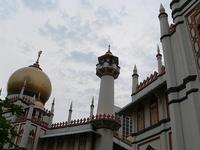
Sultan Mosque in Kampong Glam anchors this Muslim enclave.Singapore is probably not the country that readily springs to mind when we think of world music. This developed nation in Southeast Asia has probably more high-rise buildings dotting its coast compared to the collective high notes of symphony orchestras worldwide. Highways and traffic in the city create a greater din than the call of a million crows.
Still, there’s a well-hidden secret. In an Arabic enclave at Kampong Glam, south centre of the island, stands a quiet shop that is as unassuming as the street itself. Kampong Glam is believed to be named after the Glam sea gypsies who lived in the original Malay village southwest of the Rochor River. The only compelling figure in this area is the majestic Sultan Mosque which frames the sky with its gleaming gold dome, frequented by men with songkok (headgear) for Friday afternoon prayers.
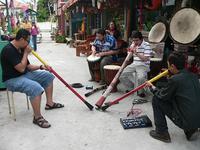
Yet Tribal Arts, run by Sonny Wee, on a sleepy afternoon can surprise by bursting into rhythmic
Jammers outside Tribal Arts on a slow weekend. percussion and didgeridoo drone. This music drew me to locate its origin while strolling through the Muslim Heritage Centre and surrounding buildings, and I found some guys jamming just outside this shop, with Sonny joining in at the gong.
Call it a house of curios. A mind-boggling variety of musical instruments from around the world can be found here – most are new, some second hand, having carefully been restored by this proprietor, to be as good as new.
“I loved collecting musical instruments, and that’s how I started this shop a few years ago,” says Sonny. He shares how as a boy, with no formal training, he dabbled with the piano and guitar. Later he discovered the lure of drums, particularly djembe, which he now makes by hand, if not enlisting the help of trained Javanese craftsmen.
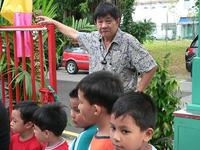
Sonny Wee flanked by little on-lookers.Passionate about hitting the right note, Sonny tunes the drumheads himself. “I have a secret recipe to season the skin, and pull it very, very hard to give it the right tautness,” he gestures showing his worn hands, which he then whacks the drum to produce quite a boom.
Students, working adults, musicians, collectors and tourists are drawn to his collection of djembe, angklong, kalemba, didgeridoo, gambus, seruling, veena, banjo, mandolin and maracas with buah kaluah, among others. Sonny has specially stocked up the kuda kepang, a Javanese totemic dance horse, due to a rising trend in cultural performances in Singapore.
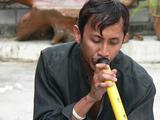
Once in the store, musicians such as Firdaus Haji can’t keep his hands to himself – the range of instruments is just too irresistible. The Singapore-based graphic designer had a local band called Urban Karma and has cut two EPs and one single. He shares how he journeyed from being a hard rock guitarist to world music experimentalist. “I was intrigued by the exotic sounds and started with the harmonica, then the bagpipe, moving on to the sitar and the didgeridoo. I incorporated the Javanese kompang into my
Firdaus Haji who is Malay digs the didjeridoo. rock music.”
Firdaus bantered with the three other players in between jam sets on Tribal Arts front porch, perfecting the improvisation by trial and error and the didjeridoo amplified by synthesizers. Sonny doesn’t mind having these spontaneous sessions at his doorstep even when customers forget to shop but watch the players instead. “Many wannabes have been spotted here,” he smiles.
Taking the cue from improvisation, Sonny finds himself tasked with setting up newly discovered musicians at his shop to perform at local charity shows, even arranging the scores to blend Asian tunes with Western strains. “I’m now looking at introducing the Chinese pipa between pop segments and Hindi vocals – it produces an amazing effect. What I need is the right interpretation,” he says, lost in his own thoughts.

Tribal Arts is a favourite haunt for djembes of all sizes.Who would have thought languid Kampong Glam could go beyond its core focus of Arabic trade and Malay culture to start carving itself an offshoot - world music heritage? I pondered on this discovery as I poured myself some hot minty tea out of a curvy Moroccan brass pot at Bussorah Street, where the Saracenic Sultan Mosque looks on stout and silent.
Getting There
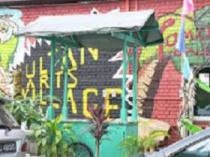
Tribal Arts at 71 Sultan Gate is part of the Sultan Arts Village. It is open everyday from 10 am to 9 pm.
Take the MRT to Bugis Station (EW12) and walk along Victoria Street towards Arab Street and Sultan Gate Street. Make sure you work in enough time for a bit of wander and a bite of Turkish, Arabic, Javanese, Moroccan food and more.
Contact Sonny Wee at sonnysw48@gmail.com or at +65-9726 4564.